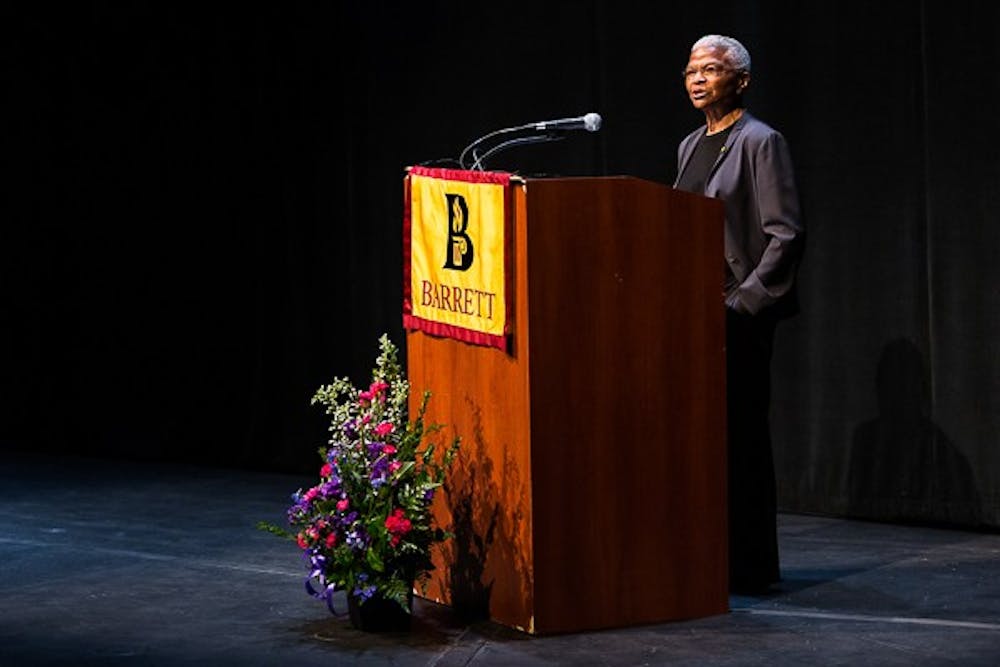 Mary Frances Berry speaks at the John J. Rhodes Lecture in Public Policy & American Institutions at the Galvin Playhouse on Wednesday, Feb. 25, 2015. In the lecture, presented by Barrett, the Honors College, Berry covered a variety of human and civil rights issues and challenged the audience to make a change for justice. (Daniel Kwon/The State Press)
Mary Frances Berry speaks at the John J. Rhodes Lecture in Public Policy & American Institutions at the Galvin Playhouse on Wednesday, Feb. 25, 2015. In the lecture, presented by Barrett, the Honors College, Berry covered a variety of human and civil rights issues and challenged the audience to make a change for justice. (Daniel Kwon/The State Press)Mary Frances Berry, professor at the University of Pennsylvania, told students and community members at a lecture on the Tempe campus Wednesday to continue to fight for equality and equal rights because there are still issues that need to be addressed.
Berry's lecture focused on how individuals in the 21st century can go about achieving justice and opportunity when it comes to civil rights and social issues.
“We see that despite the progress we’ve made there are head winds against opportunity,” Berry said.
Berry said the head winds include both domestic and foreign issues. Throughout the lecture, she explored topics including war, immigration, gender equality, hiring discrimination, poverty and affirmative action.
Berry said to foster change in these areas, public policy leaders have to work together.
“What’s wrong is that people refuse to talk to each other,” Berry said.
Prior to the lecture, Barrett, The Honors College and the Justice and Social Inquiry Program at the School of Social Transformation at ASU hosted a breakfast panel discussion with Berry and local civil rights activists and leaders.
Berry said discussion must occur at a local level between individuals on differing sides because a middle ground can be achieved.
“It doesn't do any good to rebut other peoples' thoughts without listening to them,” Berry said.
Berry, who is the Geraldine R. Segal Professor of American Social Thought and professor of history at the University of Pennsylvania, served as a chairwoman on the U.S. Civil Rights Commission from 1993-2004, but has been a member since 1980.
During the lecture, Berry said movements and discussions are a big part of making progress towards change. She related her work as the co-founder of the Free South Africa Movement, a movement that fought to end the apartheid in South Africa in the 1980s.
“When you have a movement you have to keep it simple, you have to be persistent, you have to be willing to sacrifice your time and energy and you have to know that people are going to criticize you,” Berry said.
Computer science freshman Kiana Ghazouli said this was the most inspirational advice she took away.
Ghazouli is the co-founder of a new group called ASU Devils for Gender Equality, which is an all inclusive club to accommodate all persons regardless of their gender, race and sexuality.
“I learned that it’s very important for us to make sure our message is clear and simple,” Ghazouli said. “We have to understand that we are going to face adversity, but we have to accept that in the fight for gender equality.”
Biology freshman Aatikah Mouti said the lecture pointed out the injustices that occur both at home and abroad.
“A lot of people don't realize that discrimination still exists,” Mouti said. “We should do what we can to reduce injustice at home, but also in other countries.”
Berry said the narrative revolving justice and opportunity has become all about inclusion and diversity. However, there is still a gap when it comes to seeing equal opportunities in all areas of people’s lives, including in the workplace, educational institutions and the government.
“The struggle is never a straight line,” Berry said. “We move forward and backward, but each generation needs to make its own dent in the wall of injustice.”
Reach the reporter at mcasti18@asu.edu.
Like The State Press on Facebook and follow @statepress on Twitter.




